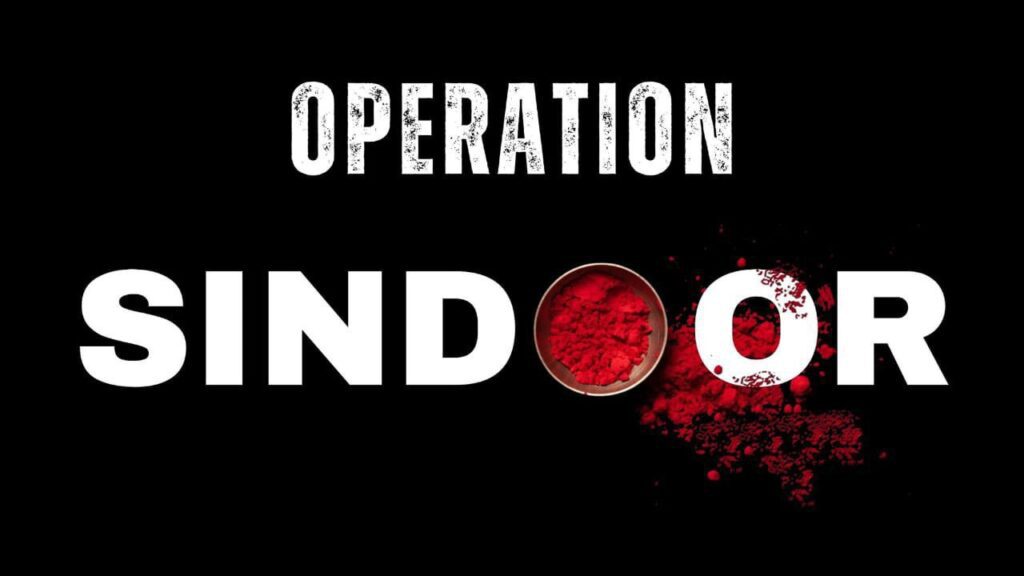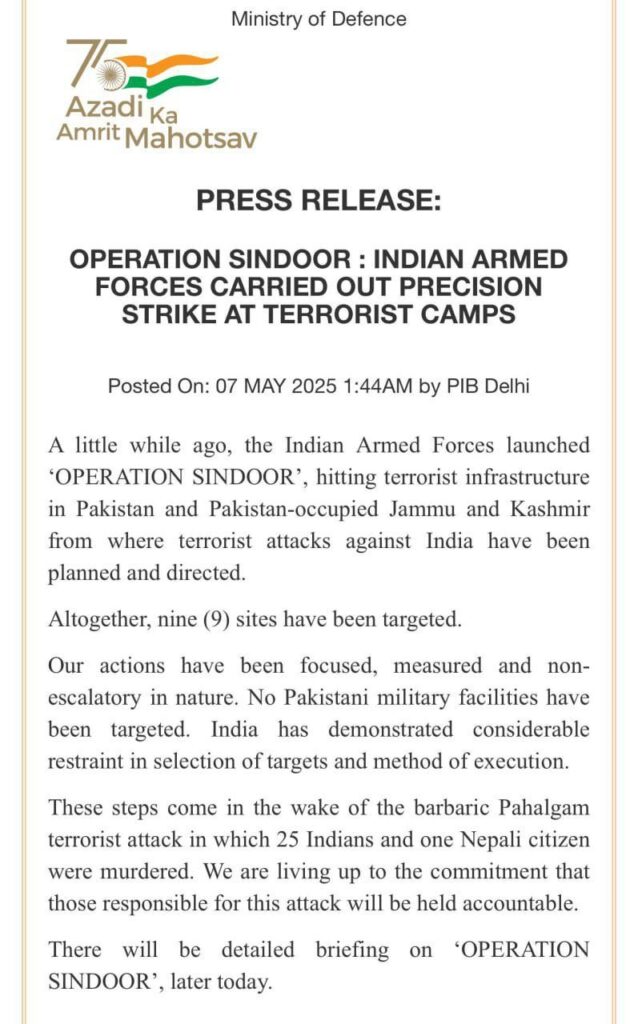On the night of May 7, 2025, India sent a clear message to the world with Operation Sindoor-a series of precision military strikes targeting terror camps deep inside Pakistan and Pakistan-occupied Kashmir (PoK). This operation, named to honor the 25 women widowed in the Pahalgam terror attack, was not just a display of military might, but a moment of national unity. In these defining hours, the armed forces acted with courage and restraint, while millions of Indian civilians showed how a civilian can contribute to nation-through solidarity, vigilance, and unwavering support.

Table of Contents
The Pahalgam Attack
On April 22, 2025, terrorists affiliated with Jaish-e-Mohammed (JeM) and Lashkar-e-Taiba (LeT) attacked a tourist bus in Pahalgam, Kashmir, killing 26 people, including a Nepali citizen. The brutality of the attack-where victims were reportedly asked their religion before being executed-shocked the nation and galvanized the government into action. Prime Minister Narendra Modi promised justice, stating, “We will not rest until the last perpetrator is brought to account.”
Operation Sindoor: A Measured, Decisive Response
Key Details:
- Date & Time: May 7, 2025, 1:44 AM
- Scope: Nine terror camps struck in Pakistan and PoJK, including JeM’s Bahawalpur HQ and LeT’s Muridke base
- Forces: Joint operation by Army, Air Force, and Navy using precision-guided munitions
- Casualties: Estimated 80–90 terrorists neutralized
- Restraint: No Pakistani military targets struck, avoiding escalation

Symbolism:
The operation’s name, “Sindoor,” refers to the vermilion worn by married Hindu women, honoring the 25 widows of Pahalgam. As Sangita Ganbote, wife of a victim, said: “By naming it Operation Sindoor, they’ve respected the women whose sindoor was erased by terrorists.”
The Social Media War: Tweets, Banter, and the Battle for Narrative
Pakistani Leadership and Public Reaction
After the strikes, Pakistani Prime Minister Shehbaz Sharif tweeted in Arabic and English, calling the operation “an act of war” and vowing a “resolute response.” He wrote:
“The treacherous enemy has launched a cowardly attack on five locations within Pakistan. This heinous act of aggression will not go unpunished. Pakistan reserves the absolute right to respond decisively to this unprovoked Indian attack-a resolute response is already underway.”
Other Pakistani officials and media outlets quickly followed with claims of civilian casualties and threats of massive retaliation. However, these statements were met with skepticism and even ridicule on social media, as flight tracking showed Pakistani airspace nearly empty after the strikes, and no credible evidence of Indian casualties was presented.
Pakistani Citizens: Banter and Irony
Many Pakistani Twitter users, instead of rallying behind their government, openly mocked their leadership. Tweets ranged from sarcastic remarks about “saving terrorists” to memes highlighting the government’s quickness to mourn dead militants while failing to protect its own civilians. Some users posted:
- “Our leaders cry more for dead terrorists than for our own people.”
- “Why is the government so quick to defend the terror camps? Shouldn’t we be rooting out these elements ourselves?”
This public banter exposed a deep frustration among ordinary Pakistanis, who questioned why their government was risking national security for the sake of terror groups.
Indian Pride and Support
On the Indian side, Twitter was flooded with messages of pride and gratitude for the armed forces. Hashtags like #OperationSindoor, #JaiHind, and #NationFirst trended for hours. Bollywood celebrities, sports icons, and ordinary citizens alike posted messages such as:
- “Jai Hind Ki Sena… भारत माता की जय !!!! #OperationSindoor” – Riteish Deshmukh
- “This is not just revenge, it’s justice for every Indian family that lost someone.” – A user from Bihar
- “The Indian Army has protected the sindoor on our sisters’ foreheads. We reject terrorism.” – Tejashwi Yadav, Bihar leader
Victims’ families expressed a bittersweet sense of closure. Asvari Jagdale, daughter of a Pahalgam victim, tweeted, “We cried tears of joy. Modi avenged our loss. The name Operation Sindoor means everything to us.”
The Armed Forces: Our Shield and Our Pride
India’s armed forces are not just defenders of the border-they are the backbone of national resilience. From disaster relief in floods and earthquakes to building infrastructure in the remotest corners, their service goes far beyond combat.
As Defence Minister Rajnath Singh said, “Every soldier is a civilian in uniform, and every civilian is a soldier without one.” This ethos reminds us that the nation’s security is a shared responsibility.
How a Civilian Can Contribute to Nation During Times Like These
Even in the toughest times, how a civilian can contribute to nation becomes more important than ever. Whether it’s staying alert and reporting suspicious activity, volunteering for relief efforts, supporting the families of our armed forces, or simply promoting unity and fulfilling civic duties-every action counts. Want more practical ways to make a difference? Explore our in-depth blog on this very topic and discover how you can stand shoulder-to-shoulder with India’s heroes.
Nation First, Always First
Operation Sindoor was more than a military strike-it was a declaration that India’s security hinges on both its soldiers and citizens. As foreign minister S Jaishankar stated: “The world must show zero tolerance for terrorism.” But tolerance begins at home, with every Indian embracing their role as a guardian of the nation’s values.
From the families of Pahalgam to the soldiers on the frontier, India’s strength lies in its unity. Let us pledge to stand shoulder-to-shoulder with our armed forces, not just in moments of crisis, but in everyday acts of patriotism. For as the tears of Asvari Jagdale remind us: “When the nation avenges its children, even grief transforms into pride.”
Jai Hind. Jai Bharat.
[…] Read more about : Operation Sindoor: India Strikes Back! Fight against Terror […]